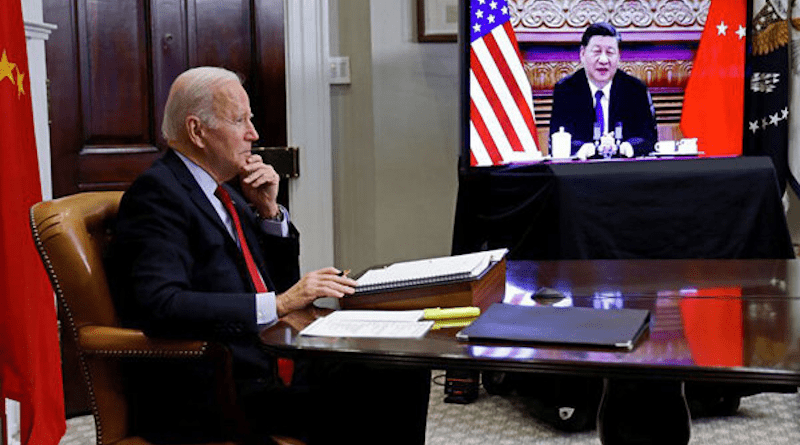Biden, Xi Attempt To Defuse US-China Tensions – OpEd
By Arab News
By Andrew Hammond*
Expectations had been set low for Monday’s first presidential summit between Joe Biden and Xi Jinping. However, they spoke via video call for an unexpectedly long three-and-a-half hours, with the Chinese leader greeting his US counterpart as his “old friend.”
While it is much too optimistic to say that bilateral ties have now turned a corner, atmospherics have — at least temporarily — improved and this underlines that the direction of bilateral relations need not inevitably be toward ever greater hostility. The occasional warmth of the summit also builds on the unexpected bilateral climate cooperation deal announced at COP26 in Glasgow.
Despite the wide-ranging security and economic-related disagreements that exist between the two sides, this month’s climate accord indicates there may remain scope to work together where there are clearly defined common interests. After all, tackling global warming is a key political priority of both nations and Xi said in the meeting that “humanity lives in a global village and we face multiple challenges together. China and the United States need to increase communication and cooperation.”
The fact that Biden and Xi have a personal backstory, having first got to know each other when they were both vice presidents, may prove helpful. This is because, while the potentially very difficult economic and security fundamentals will largely determine the course of US-China ties in the coming years, personal chemistry helps. Biden told Xi that “we need to establish some commonsense guardrails, to be clear and honest where we disagree, and work together where our interests intersect,” so that competition does not turn into conflict.
The importance of this personal factor was shown during Donald Trump’s presidency, when the-then US leader’s erratic nature accentuated the natural zigzags in ties. During the Obama years, by contrast, relations remained generally cordial, in significant part because of the commitment of Xi and Barack Obama to bilateral stability. At that time, Xi even outlined a desire to fundamentally redevelop the great power relationship with the US to avoid the conflictual patterns of the past.
That goal still lacks any obvious definition the best part of a decade later and the dynamics of the bilateral relationship have changed very significantly in the intervening years. This is not just because of the controversies of the pandemic and the extra uncertainty injected into ties by Trump. Take the example of Taiwan, where China’s recent incursions into Taipei’s air defense identification zone have alarmed many in Washington. During this week’s summit, Biden said he opposes unilateral efforts to change the status quo or undermine peace and stability across the Taiwan Strait, while Xi said that the US president is playing with fire on the issue.
Even if such tensions can be managed in the coming years — which is a big if — there are wider in-built hazards in the bilateral landscape. These include American legislation requiring the US commerce secretary to deliver a “Report on Chinese Investment” in the US to Congress every two years up to 2026. The bill singles out Chinese investment as a security threat and zeros in on Beijing’s “Made in China 2025” plan.
This and other legislation, such as the Hong Kong Human Rights and Democracy Act, have sown the seeds for future strife, with the Chinese Defense Ministry asserting that they “abound in Cold War thinking, exaggerate the level of the China-US confrontation… undermine the atmosphere of development of China-US military ties, and damage China-US mutual trust and cooperation.”
Amid all these challenges, a key issue that Xi will be pondering is how long Biden will be in power for. While the Chinese president is tightening his grip by laying the foundations for a third five-year term, it is not even certain that his US counterpart will seek a second, as he will be in his early 80s at the time of the 2024 election.
This is not a trivial point, as Xi would be more likely to engage substantively with Biden if he expected the latter to be in power for eight years rather than four. Both may ultimately favor a strategic dialogue to try to find a framework, or grand bargain, to renew bilateral relations, but this is the type of initiative that may require more than a single US presidential term to formulate.
Xi is also acutely aware that, for all the new US president’s indications that he might row back some of Trump’s overt hostility to China, Biden has yet to reverse any of his predecessor’s fundamental policies. Indeed, he has reaffirmed many of them, including rejecting nearly all of China’s maritime claims in the South China Sea.
The most likely prognosis for US-China ties in the short to medium term, therefore, is the biding of time and tensions. However, this is not inevitable, despite the growing conventional wisdom that views bilateral ties through an ever more pessimistic prism.
- Andrew Hammond is an Associate at LSE IDEAS at the London School of Economics.

